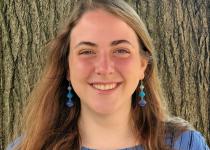Singing in Sync: How synchronized microphones and machine learning scale up studies of wild bird behavior
Collecting information on individual animals’ vocal and movement behavior is important in many ecological and behavioral applications. However, gathering this information in wild animals may be especially challenging, time-consuming, invasive, or disruptive. This talk will describe a non-invasive method we engineered for gathering behavioral data for individual wild birds at large scales. We gather acoustic data using an array of 49 autonomous recorders. Audio is precisely time-stamped and synchronized using GPS receivers onboard the sound recorder. To estimate birds’ positions, we created tools for automated song detection and localization in OpenSoundscape, an open-source Python package for bioacoustic analyses. In particular, we create machine learning algorithms to detect the songs of each species, use a spatial-matching algorithm to match up detections of the same sound event recorded on multiple microphones, then estimate the position from which each sound event was sung. I will discuss several applications of these new techniques, including mapping individual birds’ home territories, estimating bird population sizes, observing birds’ movement and behavior, and creating libraries of individual birds’ distinctive voices.
Date and Time
Location
Hosts
Registration
-
 Add Event to Calendar
Add Event to Calendar
Loading virtual attendance info...
Speakers
Tessa Rhinehart of University of PIttsburgh
Singing in Sync: How synchronized microphones and machine learning scale up studies of wild bird behavior
Biography:
Tessa Rhinehart is a PhD student researching conservation and ecology at the University of Pittsburgh. Her work includes developing machine learning, statistical, and data science methods for large-scale analysis of autonomous sound recording data. She uses these techniques to study how sound-producing animals such as birds respond to environmental change.
Agenda
mac


